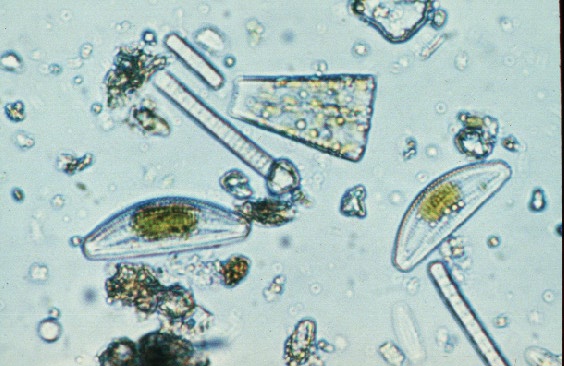Alex Heim
0726107
The article posted on Treehugger.com, written by John Laumer makes many claims about environmental ethics and the true meaning of environmentalism. Recent fluctuations in salmon populations in which the cause of these fluctuations is the iron rich ash deposited by the Kasatochi Volcano in august 2008 is the main example used by Laumer to criticize environmental ethicists who argued that iron seeding in the pacific as a dangerous method to revive salmon populations.
“Anti-science thinking presupposes negative outcomes. It skips over complex issues and pulls us into ethical and moral opposition to new ideas before real understanding can even be offered.

The 2010 Fraser salmon explosion by all accounts was not negative. Quite the opposite: it is relieving to see a return of bountiful nature.”
Above: Diatom algae, the abundant food source of young salmon in the 2010 Fraser river boom
Laurmers opinion is that any argument which has carefully weighed the possible outcomes and determines that the risks outweigh the benefits is anti-science. Science and morality are closely linked especially in the field of environmental science. The environment is something which the human population has just begun to realize may have more value than that of its obvious instrumental value to the human race. This shift in thinking is leading to a shift in moral beliefs from that of an anthropocentric moral outlook to something in-between anthropocentric and ecoholist. To hold an opinion on the environment and how it should be maintained and managed in a sustainable way is to hold a specific moral view which Laumer is failing to recognize in his argument.
Laurmer is also implying that the iron from the volcanic eruption can act as a study reflecting the effects that iron seeding would have on ecosystems. He uses the growth in the salmon population as a positive result of iron seeding. He talks of “the complexity of the marine ecosystem” and then states that there is no evidence of ecosystem disruption or upset and that this had no effect on the people living on the other side of the globe. History has shown that environmental issues can take a long time to manifest themselves; from the disaster with DDT and bird populations which took years to become visible through bioaccumulation and amplification or the use of freons and chloroflourocarbons and their effect on the ozone layer, if we are to lean from these mistakes we need to take caution when introducing and implementing “a fix” for an environmental problem. Laumer would be better off saying that this eruption and subsequent deposit of iron rich ash could serve as a “natural” study to see the effects of iron seeding rather than making claims that it proves the growth of salmon populations due to iron seeding is a good thing with no adverse effects. The boom in population was just this year we have yet to prove that no adverse effects have occurred.
Laurmer could have had a great article supporting the field geo-engineering had his arguments been backed by reason and not opinions and personal vendettas attacking political groups for doing their jobs. Laurmer himself pretty much sums up my arguments to the weakness of his when he states:
“there is no evidence indicating that the predators which normally preyed on salmon, humans included, suddenly disappeared. The evidence does, however, point to the ocean pastures having been provided a missing nutrient or nutrients, giving the young salmon an unusually good and lasting food supply.”
Laurmer hits the nail on the head with this one causing all his previous arguments to come crashing down. It’s true, the salmon were provided with an unusually good food supply, unusual being the key word, this deposit of iron while being a natural process does not occur every year or even every few years, it was a rare geological process which humans probably shouldn’t try to mimic as a method of conservation but as Laurmer argues we won’t know unless we try or more correctly observe . All in all the arguments made are weak but when examined it is seen that his point could have been portrayed in a stronger manner not laden with bias.
Photo:http://www.life.umd.edu/classroom/bsci124/lec36.html
No comments:
Post a Comment